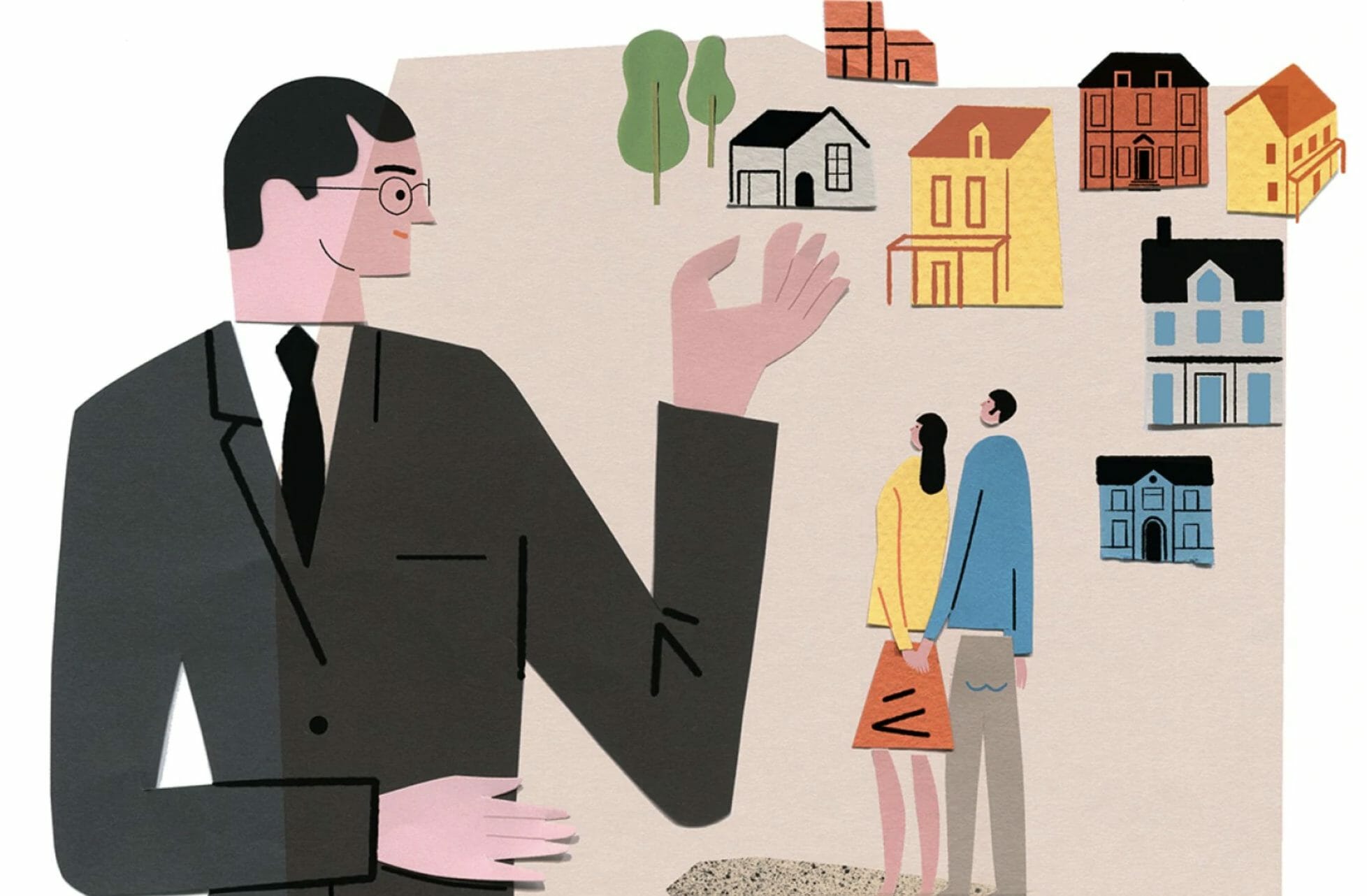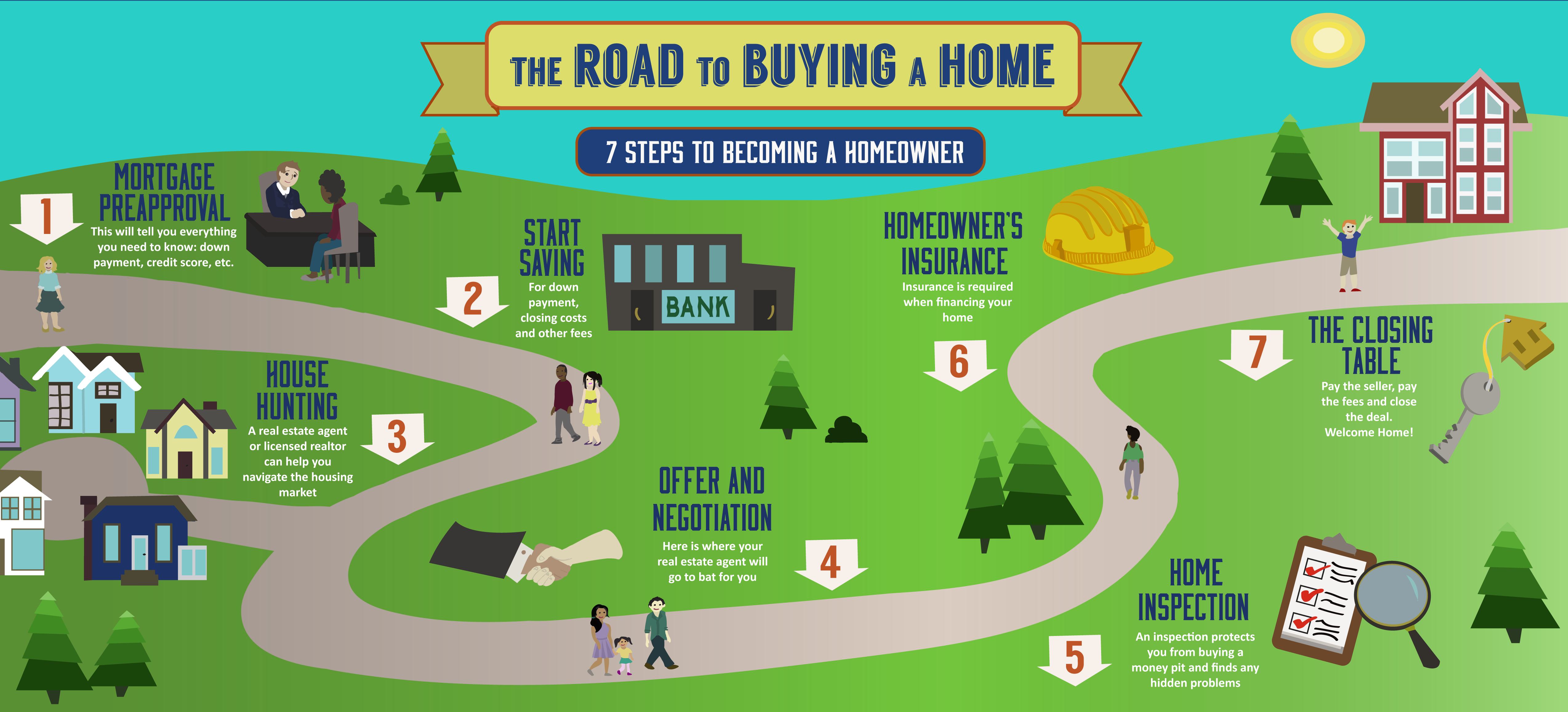Many individuals spend years, or even decades, dreaming about purchasing a home before taking the first steps toward making it a reality. You might have envisioned the ideal number of bedrooms, the characteristics of your preferred neighborhood, and even the specific lawn gnome to adorn your front garden.
However, there’s more to a home purchase than picking your favorite listing and moving in. It’s important to understand all the steps of buying a house, as well as what to look for when buying, what questions to ask, understand the hidden costs, and how to close on it.
There’s no doubt in the positive power of buying real estate if done properly. As the famous Will Rogers eloquently put it:
Don’t wait to buy real estate, buy real estate and wait.
Making hasty decisions when purchasing a house, especially your first one, is something you’ll want to avoid. Let us guide you through the process to ensure you step into your dream home responsibly.
What are the most important things when buying a house?
Before closing on your dream home, you must understand the steps to buying a house. Navigating the home-buying process can be challenging, but it becomes much easier if you have a plan and a clear path forward.
Here are the critical steps you must take as you’re considering this major life step.
1. Take stock of your personal finances
You won’t be able to buy a home until you know what you can afford based on your personal finances. Keep track of your credit score and try to improve it as much as possible.
Improving your credit score can significantly ease the loan approval process for you. Additionally, it’s important to assess how much you have saved for a down payment.
Generally, homebuyers are expected to put up between 5 and 20 percent of the price of a property as a down payment. The average down payment was 14.71% of the home’s purchase price in 2023, according to Realtor.com data.
2. Research the local market
Well before making an offer on a home, it’s crucial to keep an eye on market conditions in your desired area. Take particular note of how long homes within your budget typically remain on the market, as well as any significant fluctuations in asking prices. Collaborating with a local realtor can provide valuable insights into these critical data points, enhancing your understanding of the market dynamics.
3. Go through the pre-approval process
While you can estimate your house-buying budget based on your financial situation and credit score, consulting with a lender will help pinpoint an exact figure.
To secure pre-approval for a mortgage, you’ll need to provide your lender with detailed financial information, encompassing both your debts and assets.
4. List your priorities
Once you know how much house you can afford, you can begin your search for a home among listings in your area of choice.
While it’s unlikely you’ll find a listing that checks every box on your wishlist, maintaining a clear understanding of your priorities is crucial during the house-hunting process.
Document your priorities and make a point to regularly refer back to them as you start viewing homes. We’ll delve deeper into this aspect later.
5. Find an agent
With your list of priorities and your pre-approval information in hand, speak to a real estate agent who can help you find a home.
An agent can facilitate negotiations between buyers and sellers and show you properties that fit your budget and meet your needs.
6. Make an offer and negotiate
With the help of your real estate agent, you will determine a fair price to offer the owners of a home in which you are interested. Try to avoid making a low-ball offer.
Frequently, owners who receive an offer significantly below their expectations will outright refuse it, choosing not to engage in further negotiations.
You should always defer to the opinion of your agent, as he or she will know a lot more about the housing market and the rules that apply to home offers.
7. Handle inspections and secure a loan
Home inspections are a necessary part of the home-buying process. Don’t skip this. It’s important to have the house you are purchasing professionally inspected to ensure you are aware of any damage or signs of structural wear.
An inspection will confirm whether the homeowners were honest in their listing and reveal any issues that might have gone unnoticed. After the inspection and appraisal of the property, you can secure your loan with a bank or lender.
8. Attorney Review?
While having an attorney review your purchase contract is not always mandatory, it is highly recommended for most homebuyers to ensure they fully understand and are comfortable with the terms of the contract before signing.
The potential benefits of legal guidance often outweigh the cost, especially considering the significant financial investment involved in buying a house.
9. Submit paperwork and close
Collaborating closely with your lender and real estate agent is essential to ensure all necessary paperwork for your purchase is accurately prepared and submitted. Once all documentation is finalized and the seller receives payment, you will be able to move into your new home.
What to look for when buying a house
When you begin touring homes with your real estate agent, you may be focused on the size of the yard or the square footage of the kitchen, but there are other attributes to a home that are even more important to consider.
Ensuring you’re making a wise investment is crucial when purchasing a home. It’s important to steer clear of properties with significant issues or those requiring expensive repairs soon after acquisition. Familiarizing yourself with key factors to consider during the home-buying process will help you make an informed investment decision.
Our proven, data-driven approach to building a portfolio of income-producing rental properties that perform in the long-term.
Home Inspection Considerations
1. Roof condition
A traditional shingle roof will have to be replaced every 20 to 25 years—and a full professional replacement may cost $8,000 or more. The actual cost can vary significantly depending on several factors such as roof size, shingle type, location, and complexity (roof slant, etc.).
2. Are there signs of foundational damage?
Minor issues such as faded paint or a broken light fixture can typically be fixed easily and affordably. However, foundational damage in a home can lead to repair costs running into the thousands. It’s important to inspect for signs of cracking around the foundation both inside and outside the home.
Additionally, take note of any unevenness in the floors, as this could signal a compromised foundation.
3. Potential for flooding
While the allure of a home near a body of water can be compelling, it’s crucial to assess the potential risks associated with such proximity before making a decision.
Being near water increases the likelihood of experiencing flooding, particularly during stormy seasons. Ensuring you have adequate insurance coverage for such events is crucial, so conducting thorough research is essential.
We don't buy our insurance like our grandparents. We get it in an online marketplace where prices are highly competitive and signing up doesn't require high levels of stress or time. Got a quote in under 10 minutes without talking to anyone - just how we like it.
4. Mold, weathering and water damage
Take a peek inside the cabinetry for signs of mold growth around pipes. Mold growth may indicate a leaky plumbing system, previous flooding, or improper ventilation.
You should also look for other signs of water damage and excessive weathering, such as musty odors or peeling paint.
5. Insulation and energy efficiency
Make sure you are aware of the condition of the insulation in a home, especially if it was built several decades ago.
The better the insulation of a house is, the less you will have to spend on utility costs when it comes to heating and cooling throughout the year.
Pitfalls: Hidden costs of buying a home
You might be ready to handle the monthly mortgage payments, interest rates, and the initial down payment required for purchasing a home, but there are hidden costs associated with buying a property that you may not be aware of.
Closing costs refer to the fees and expenses paid in addition to the purchase price of a home, incurred during the finalization of the buying process. These costs typically range from 2% to 5% of the loan amount.
Before you even move into your new home, you’ll need to cover fees for your mortgage loan, a home inspection, and other closing costs.
1. General Inspection
A home inspection involves a detailed visual assessment of a property’s physical condition. Typically, the cost of a home inspection varies between $400 and $600, although this can fluctuate based on your location. Factors influencing the price include the size of the property and the specific type of inspection being conducted.
2. Loan Origination Fees
Loan origination fees are charged by lenders to cover the costs associated with processing and underwriting your mortgage application. These fees typically cover tasks such as verifying your income and employment, assessing your creditworthiness, and preparing the necessary loan documents.
The origination fee is usually expressed as a percentage of the total loan amount and typically falls between 0.5% and 1%. So, for a $300,000 mortgage, you can expect the origination fee to range from $1,500 to $3,000.

3. Real Estate Agent Fees
In a standard real estate transaction, the seller pays a commission to both the buyer’s and seller’s agents. This commission, usually a percentage of the home’s sale price, is divided between the two agents.
Buyers benefit from a buyer’s agent’s services without directly paying a fee, as the cost is included in the home’s selling price, paid by the seller. Moreover, buyers might offer a discount to sellers not using an agent to lower the purchase price.
4. Other Closing Costs
Not all the closing costs listed below will apply to every deal, and yes, there are quite a few of them.
Homeowner’s insurance premium: Covers the first year’s premium for property damage and liability insurance.
Mortgage insurance (if applicable): Required for loans with a down payment of less than 20% of the purchase price.
Prorated property taxes: This covers the portion of property taxes you’ll be responsible for from the closing date until the end of the tax year.
Attorney fees: Varies depending on location and whether required by law.
Recording fees: Covers the cost of registering the deed with the local government.
Discount points: Optional upfront payment that can lower your interest rate. Each point usually equals 1% of the loan amount.
Appraisal fee: Pays for a professional to assess the property’s market value.
Underwriting fee: Covers the lender’s cost of assessing your creditworthiness and risk.
Title search and insurance: Ensures the property’s title is clear and protects against potential ownership claims.
Escrow fees: Covers the cost of a neutral third party holding funds and documents until the closing.
Three days before closing on a home, you will receive a Closing Disclosure form from your lender, outlining all the expected closing costs. Make sure you go through this document and clear up any questions or worries before you sign anything.
Questions to ask when buying a house
Below are several key questions you should ask when buying a house:
1. Are there any ongoing maintenance issues?
Over time, you’ll become familiar with all the unique quirks of your new home, but it’s wise to learn as much as possible from the current owners before making your purchase decision.
2. How much do utilities cost on average?
The monthly utility costs for a home are significantly influenced by the efficiency of its built-in appliances, fixtures, and features. Understanding this will help you budget for utilities more accurately and determine if there’s a need to upgrade insulation or appliances for better energy efficiency.
On average, Americans spend $469 per month on their essential utilities.
3. What’s the neighborhood like?
When you tour a home, check out the neighborhood as well. Look at the other houses on the block and take a peek at the average listing price of comparable homes in the area.
Find out whether there are any resources or amenities within walking distance, like parks and grocery stores, and do some research on the local schools (especially if you have or plan on having children).
4. Is the insulation in good shape?
Is the insulation effective? Home insulation plays a crucial role in maintaining warmth during the winter and coolness during the summer. Old or inefficient insulation can lead to an uncomfortable indoor climate and result in excessive energy consumption.
5. Are there any upcoming replacement needs?
Are there any impending replacement needs? Identifying appliances or features close to the end of their lifespan is crucial, as you’ll need to factor in the cost of their replacement.
It’s important to inquire about any potential replacements and be vigilant for any indicators that suggest an item may soon need replacing, especially if these have not been previously disclosed.
What to expect on Closing Day
Closing on your home is a huge deal, so you’ve got to be ready for this final part of the buying journey. Since it’s such a big step, the process can take a bit of time.
Closing is usually at a title company’s office but can be at a lawyer’s office or another location. Attendees include you, any co-buyer(s), your real estate agent, the seller’s agent, the closing agent (title company representative), and possibly a lawyer.
Key activities include:
- Reviewing and signing important legal documents.
- Pay closing costs, which can be settled through a certified or cashier’s check, or a wire transfer, as specified in the Closing Disclosure.
- Receive keys and finalize the transfer.
Additional tips for the actual closing:
- Come prepared: Bring a valid government-issued photo ID, proof of homeowner’s insurance (if required), and any closing documents requested beforehand.
- Dress professionally and arrive promptly: Show respect for the occasion and the professionals involved.
- Ask questions: Don’t hesitate to clarify any doubts about the documents or the process. It’s your right to understand what you’re signing.
- Celebrate: Once everything is finalized, take a moment to celebrate this momentous occasion!
Happy house hunting!





![Home Equity Loans: Requirements, HELOCs, and Securing One [UPDATED]](https://www.listenmoneymatters.com/wp-content/uploads/2019/02/home-equity-loans-768x432.png)
